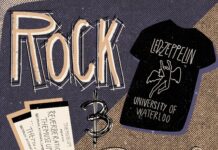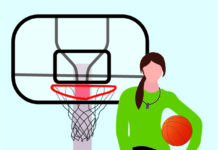A majority of UW students could probably admit that managing their courses and personal time is a challenging task, but for UW Warriors, this task is combined with the demands of their athletic schedules. </p>
Since 2012, Colin Behenna has been a member of the UW men’s hockey team. This season, Behenna has been ranked seventh for goals in the Canadian Interuniversity Sport (CIS) with a notable 16 goals in 26 games. In addition, Behenna is ranked 19th in points, an impressive feat given that only one other player on the UW men’s hockey team made it to the list. Even with such an impressive record, Behenna, a student in the math and business program, still maintains an average above 80 per cent.
Having played hockey since the age of four, Behenna has become very experienced in mediating his academic and athletic commitments and downtime.
“I think hockey has prepared me to manage my time effectively,” he exlpained via email. “We have very structured days in terms of practices and workouts, so it makes it a lot easier to focus on your school when you know you only have an hour block of time here and there to get stuff done.”
According to Brian Bourque, the coach of the UW men’s hockey team, Behenna’s high average isn’t all that uncommon for his players. Besides Behenna, 10 other players on the team have earned recognition for their academic achievements, receiving Academic All-Canadian titles from CIS.
In gaining this title, athletes face a strict nomination process. In addition to playing on at least one varsity team, nominated students are expected to maintain an 80 per cent average or higher and have no infractions with CIS due to their academic record at their respective university per nomination season.
While much of his success has been the result of productive scheduling, it still remains that the majority of Behenna’s week is spent at the rink.
“During the season we play two games a weekend and practise three or four times a week so I spend a great deal of my week playing hockey,” Behenna said.
With such a demanding schedule, Behenna makes it a priority not to procrastinate.
“I’m usually ahead on assignments. I try my best to start or at least have a look at them as soon as they are posted, so I can gauge the amount of time they will take.”
Maintaining this academic success becomes especially difficult during midterm season. Although scheduling does remove some of the stress, Behenna relies heavily on his athletic background to help manage and cope during midterms.
“I get more nervous for exams than any game I’ve ever played. I think hockey and working out allows me to release some stress when school does get busy, but I don’t think I will ever get over the nerves you get right before you walk into an exam.”
While coping mechanisms do help Behenna to lessen stress, they can’t account for factors outside his control. In his first year, Behenna was confronted with an overlapping time conflict between a midterm and a game. This is a common occurrence; every semester students report overlapping exam times. Finding a suitable alternative, however, may not always be easy.
“In my first year I remember I couldn’t write a midterm because of a game, and I was not allowed an alternative time. Instead, the weight of the midterm was shifted to the final, and I think it ended up being an 80 per cent final,” Behenna said. “So times like that obviously aren’t ideal, but you just have to make it work.”
After a day of intensive practice and condensed study, finding time to cool off is essential. For Behenna, mornings are for the rink and books, while evenings are spent indulging in a little popcorn kickback time: legal dramas, White House mishaps, and the occasional movie.
“[I] put in my work all day and then, after dinner, just relax … I’m really into House of Cards and Suits so whenever I have some free time, I try to watch episodes.”
Finding time to relax can be a bit of a struggle, but for Behenna, relaxing in the traditional couch potato sense has always been a bit overrated.
“I think it is important to stay active, so if I wasn’t playing hockey I’d find something else active to do rather than relaxing.”
Keeping active has always been a priority for Behenna. After spending so much time together during practice, Behenna’s teammates have understandably become some of his closest friends.
“Hockey doesn’t really affect me too much in terms of relaxing and hanging out with friends,” Behenna said. “I have developed a great deal of friendships playing hockey, so the more time I play hockey, the more I actually hang out with friends.”
With midterm season still in effect, most students can barely see past their scramble of essays and exams. It can be tedious and exhausting, and building structure within that can be especially challenging. But in Behenna’s experience, the greatest academic and personal rewards come with structure., Behenna stresses the rewards of productive scheduling to his fellow athletes and students.
“My only advice would be to try to manage your time as best as you can,” he stated. “Personally, I find it a lot easier to focus on school in the mornings so I try to get up early and get work done. Other people are more productive at night. It’s important to know when you’re most productive and try and make sure you get your school or workouts done at that time.”
For the future, Behenna is keeping his options open.
“I plan on continuing to play hockey at UW and hopefully maintain good grades. I don’t have plans [for] after graduation right now. If an opportunity to play pro did come after next year, I would love to try and continue playing hockey, but, if not, hopefully I will be able to start a career.” Behenna added, “I’m hoping that a degree in math and business will allow me to have some options when I graduate, but I don’t have a specific dream job I’m looking to get after graduation.”































